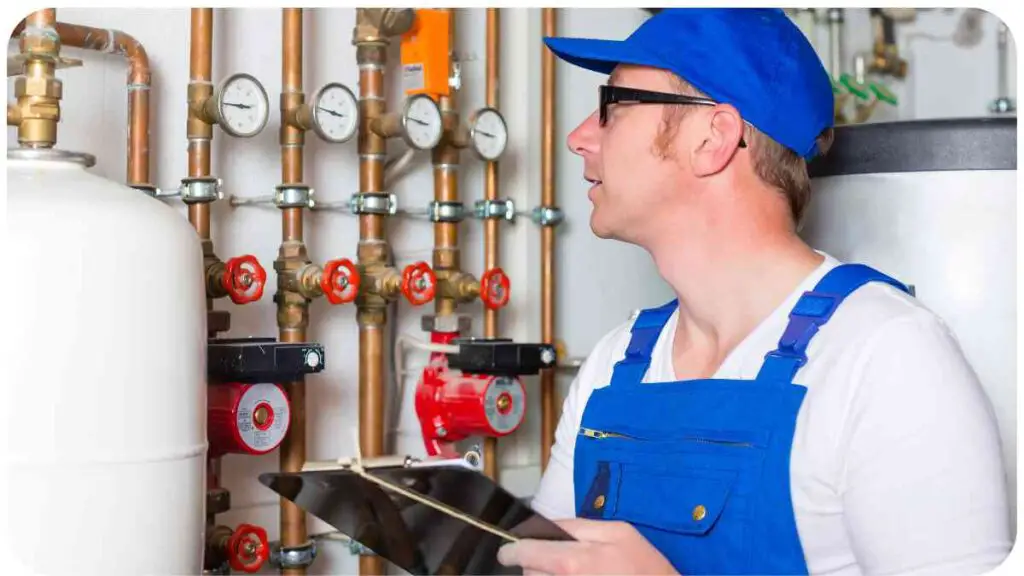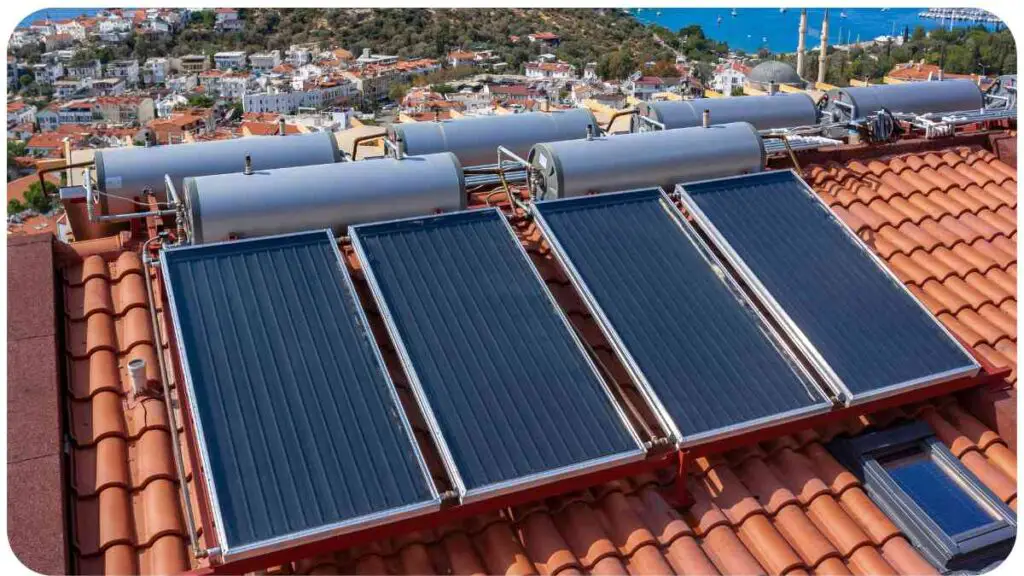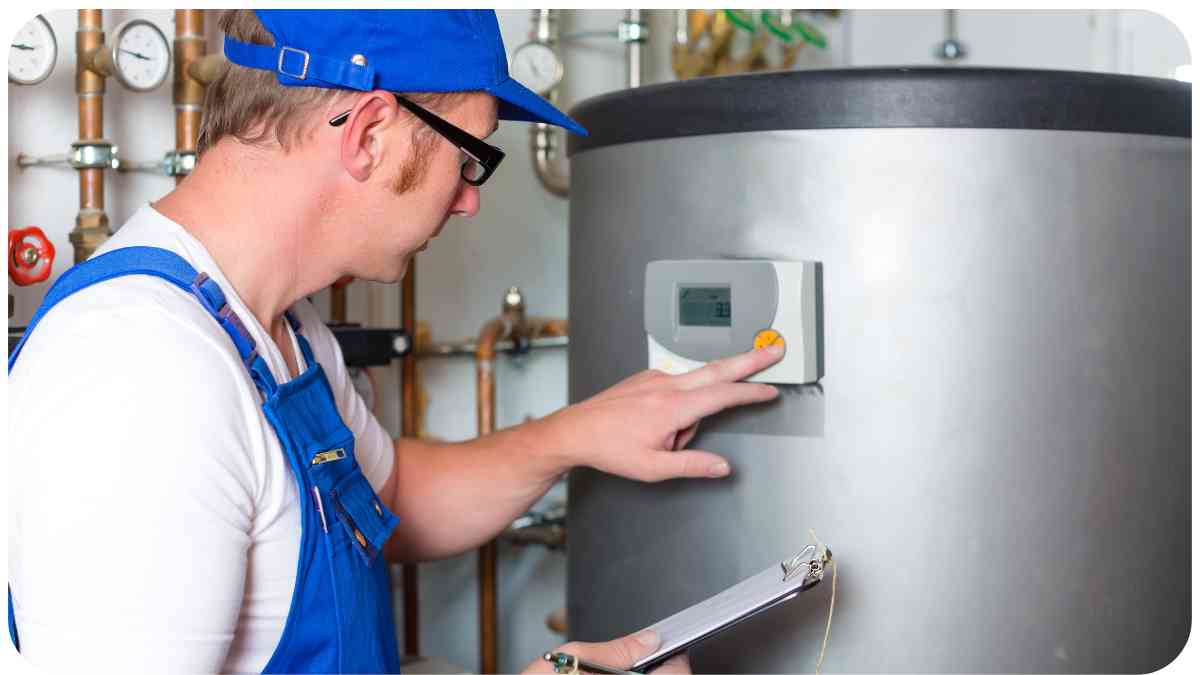Welcome to the world of city hot water systems, where the magic happens behind the scenes to ensure a warm and comfortable shower awaits you every day. In this comprehensive guide, we’ll delve into the intricacies of these systems, exploring their components, types, benefits, and challenges.
Whether you’re a homeowner or a curious soul wanting to understand the technology, this article has got you covered.
| Takeaways |
|---|
| Understanding the Components of Hot Water Systems |
| Choosing Between Conventional, Tankless, and Heat Pump Systems |
| Prioritizing Energy Efficiency in Hot Water System Selection |
| Importance of Regular Maintenance and Professional Installation |
| Exploring Future Trends: Smart Technologies and Sustainable Energy |
| Real-world Success Stories: Case Studies in Sustainable Hot Water Solutions |
| Key Considerations for Upgrading to an Energy-Efficient Hot Water System |
| Implementing Energy-Efficient Practices for Long-Term Savings |
| Addressing Common Challenges in City Hot Water Systems |
| FAQs: Essential Answers for Informed Decision-Making |
2. Understanding City Hot Water Systems

City hot water systems play a crucial role in supplying warm water to homes and businesses. Let’s unravel the mystery behind their functioning and discover the key components that make it all happen.
Efficiently manage your water heater’s performance and longevity by implementing proper maintenance. Discover essential tips for preventing water heater issues and enjoy a hassle-free experience.
3. Components of City Hot Water Systems
3.1 Boiler or Heater
The heart of any hot water system, the boiler or heater, is responsible for heating the water before it reaches your taps. This section explores different types of heaters and their efficiency.
| Heater Type | Efficiency Rating | Pros | Cons |
|---|---|---|---|
| Gas Boilers | High | Fast Heating | Higher Initial Cost, Gas Dependency |
| Electric | Moderate to High | Easy Installation, Low Maintenance | Higher Operational Costs, Limited Capacity |
3.2 Water Storage Tanks
Water storage tanks are vital in maintaining a steady supply of hot water. Explore the different types of tanks and their advantages.
| Tank Type | Pros | Cons |
|---|---|---|
| Traditional | Affordable, Simple Installation | Heat Loss, Limited Capacity |
| Tankless | Energy-Efficient, Space-Saving | Higher Initial Cost, Flow Rate Limitations |
3.3 Circulation System
Understanding the circulation system’s role in distributing hot water efficiently within your property is essential for optimal performance.
| Circulation Type | Pros | Cons |
|---|---|---|
| Gravity | Simple, Low Energy Consumption | Slow Heating, Limited Control |
| Pump-Assisted | Fast Heating, Improved Control | Higher Energy Consumption |
| Demand-Driven | Energy-Efficient, On-Demand Hot Water Access | Initial Cost, Complex Installation |
4. Types of City Hot Water Systems

Explore the diverse range of city hot water systems available, each catering to specific needs and preferences.
Elevate your bathing experience with effective hot water solutions. Explore insightful tips to maximize your bath time by optimizing your water heating system, ensuring a relaxing and enjoyable soak every time.
4.1 Conventional Systems
Conventional systems, with a storage tank and boiler, remain a popular choice for many households. Learn about their advantages and drawbacks.
| Aspect | Details |
|---|---|
| Initial Cost | Moderate |
| Installation | Relatively Simple |
| Efficiency | Moderate |
| Space Requirements | Moderate |
4.2 Tankless Systems
Tankless systems offer on-demand hot water, presenting a modern and efficient alternative to conventional setups. Discover the key features and considerations.
| Aspect | Details |
|---|---|
| Initial Cost | Higher than Conventional |
| Installation | Complex, Professional Installation Required |
| Efficiency | High |
| Space Requirements | Minimal |
4.3 Heat Pump Systems
Heat pump systems leverage environmental heat to warm the water, offering an energy-efficient option. Dive into the pros and cons of this innovative solution.
Uncover the reasons behind a lack of cold water in your shower. Troubleshoot and solve the mystery with practical tips, ensuring a balanced and comfortable shower experience in your home.
| Aspect | Details |
|---|---|
| Initial Cost | Moderate |
| Installation | Requires Professional Installation |
| Efficiency | High |
| Environmental Impact | Low |
5. Benefits of City Hot Water Systems
City hot water systems are designed to make your life more comfortable and efficient. Let’s delve into the advantages they offer:
- Energy Efficiency: Modern hot water systems come with energy-efficient features, helping you reduce your carbon footprint and save on utility bills.
- Consistent Temperature: With advanced technologies, these systems ensure a steady and consistent water temperature, eliminating the frustration of sudden cold showers.
- Space Saving: Tankless systems, in particular, save valuable space as they don’t require a bulky storage tank, making them ideal for smaller living spaces.
- On-Demand Hot Water: Tankless systems provide hot water on demand, ensuring you never run out, even during peak usage times.
6. Factors Influencing Hot Water System Efficiency

Maintaining the efficiency of your city hot water system is crucial for optimal performance. Let’s explore key factors that can influence its efficiency:
6.1 Temperature Settings
Adjusting your hot water system’s temperature settings can impact both energy consumption and your overall comfort. Striking the right balance is essential.
Protect your home from water damage by addressing shower-related issues. Learn effective solutions to fix your shower’s drywall and maintain a secure, moisture-free environment in your bathroom.
| Temperature Setting | Impact |
|---|---|
| Too Low | Risk of Bacterial Growth, Inadequate Heating |
| Too High | Energy Waste, Scalding Risk |
| Optimal Range | Efficient Heating, Safe Temperature |
6. Factors Influencing Hot Water System Efficiency
6.2 Insulation
Proper insulation plays a crucial role in retaining heat within your hot water system. Learn how insulation contributes to energy efficiency:
| Insulation Type | Benefits | Drawbacks |
|---|---|---|
| Fiberglass | Cost-Effective, Good Insulation Properties | Susceptible to Moisture, Compression |
| Foam Board | Excellent Insulation, Moisture Resistance | Higher Initial Cost, Installation |
| Reflective Foil | Reflects Heat, Lightweight | Limited Insulation Thickness |
6.3 Regular Maintenance
Regular maintenance is the key to a long-lasting and efficient hot water system. Let’s explore some maintenance tips to keep your system in top-notch condition:
| Maintenance Task | Frequency | Benefits |
|---|---|---|
| Flushing the System | Annually | Removes Sediment, Improves Efficiency |
| Inspecting for Leaks | Quarterly | Prevents Water Damage, Identifies Issues Early |
| Testing Pressure Relief | Bi-Annually | Ensures Safety, Prevents Overpressure |
7. Challenges in City Hot Water Systems
While city hot water systems offer numerous benefits, they are not without their challenges. Let’s explore some common hurdles users may face:
7.1 Energy Consumption
Balancing the need for hot water with energy efficiency can be a challenge. Users often grapple with finding the right settings to ensure comfort without excessive energy consumption.
Enhance your kitchen ventilation with the right extractor fan. Explore a comprehensive guide for comparing kitchen extractor fans, helping you make an informed decision to improve air quality in your culinary space.
| Challenge | Solution |
|---|---|
| High Energy Bills | Consider Energy-Efficient Upgrades |
| Inefficient Temperature | Adjust Thermostat Settings for Optimal Efficiency |
7.2 Maintenance Costs
Regular maintenance is essential but can sometimes come with unexpected costs. Users may find it challenging to budget for unforeseen repairs and replacements.
| Challenge | Solution |
|---|---|
| Unplanned Repairs | Establish a Maintenance Fund for Unexpected Costs |
| Aging Components | Consider Upgrading Older Components for Reliability |
7.3 Environmental Impact
While hot water systems contribute to comfort, their environmental impact, especially in terms of energy source, can be a concern for eco-conscious users.
| Challenge | Solution |
|---|---|
| High Carbon Footprint | Explore Renewable Energy Sources for Hot Water Systems |
| Transition to Green Energy | Consider Switching to Solar or Heat Pump Technology |
8. Choosing the Right City Hot Water System for Your Needs
Selecting the appropriate hot water system involves considering various factors. Let’s explore key considerations to guide your decision-making process:
8.1 Consideration of Space
Evaluate the available space in your home or business premises before choosing a hot water system. Tankless systems, for example, are known for their compact design, making them suitable for smaller spaces.
| Consideration | Details |
|---|---|
| Available Space | Tankless systems are space-saving options |
| Traditional vs. Tankless | Traditional systems may require more space |
8.2 Energy Efficiency Ratings
Prioritize energy-efficient hot water systems to not only save on utility bills but also reduce your environmental impact. Look for systems with high Energy Star ratings.
| Consideration | Details |
|---|---|
| Energy Star Ratings | Indicates energy efficiency of the system |
| Long-Term Cost Savings | Energy-efficient systems lead to lower bills |
8.3 Budgetary Considerations
Your budget plays a significant role in the type of hot water system you can install. Consider both the upfront costs and long-term savings.
| Consideration | Details |
|---|---|
| Initial Investment | Tankless systems often have higher upfront costs |
| Long-Term Savings | Consider potential energy savings over time |
9. Installation and Maintenance Tips
Proper installation and maintenance are crucial for the longevity and efficiency of your city hot water system. Let’s explore some essential tips:
9.1 Professional Installation
Ensure your hot water system is installed by a qualified professional. This guarantees that the system functions optimally and minimizes the risk of issues down the line.
| Installation Aspect | Details |
|---|---|
| Professional Installation | Certified technicians ensure proper setup |
| DIY Installation | Not recommended for complex systems |
9.2 Regular Inspection and Cleaning
Regular inspections and cleaning contribute to the efficiency and lifespan of your hot water system. Develop a routine to address potential issues promptly.
| Maintenance Task | Frequency | Benefits |
|---|---|---|
| Inspecting for Leaks | Quarterly | Prevents Water Damage, Identifies Issues |
| Flushing the System | Annually | Removes Sediment, Improves Efficiency |
9.3 Troubleshooting Common Issues
Being proactive in addressing common issues can prevent more significant problems. Equip yourself with the knowledge to troubleshoot and seek professional help when needed.
| Common Issues | Troubleshooting Tips |
|---|---|
| Insufficient Hot Water | Check thermostat settings, inspect for leaks |
| Strange Noises | Flush the system, inspect for sediment buildup |
| Water Temperature Fluctuation | Adjust thermostat, check for faulty components |
10. Energy-Efficient Practices for City Hot Water Systems
Enhance the efficiency of your hot water system by adopting energy-efficient practices. Let’s explore some strategies:
10.1 Smart Thermostats
Integrating smart thermostats into your hot water system allows for precise control over temperature settings. These devices can learn your usage patterns and adjust accordingly, optimizing energy consumption.
| Energy-Efficient Practice | Details |
|---|---|
| Smart Thermostats | Programmable settings for energy-efficient use |
| Learning Capabilities | Adapts to user behavior for optimized heating |
10.2 Timers and Scheduling
Implementing timers and scheduling functions can help control when your hot water system operates. This ensures that energy is used only when needed, contributing to overall efficiency.
| Energy-Efficient Practice | Details |
|---|---|
| Timers and Scheduling | Set specific times for hot water production |
| Off-Peak Hours | Schedule heating during times of lower energy demand |
10.3 Insulation Upgrades
Enhancing insulation around your hot water system minimizes heat loss, improving overall efficiency. Consider upgrading insulation materials for better performance.
| Energy-Efficient Practice | Details |
|---|---|
| Improved Insulation Materials | Reduce heat loss for higher system efficiency |
| Regular Inspection | Check for any insulation deterioration |
11. The Future of City Hot Water Systems
As technology continues to advance, the future of city hot water systems looks promising. Explore emerging trends and innovations shaping the next generation of these essential systems.
11.1 Integration of Smart Technologies
The future holds exciting possibilities for the integration of smart technologies into hot water systems. Imagine controlling your water temperature with a simple voice command or through a mobile app. This level of connectivity not only enhances user convenience but also contributes to energy savings.
| Future Trend | Details |
|---|---|
| Smart Sensors | Monitoring and adjusting water temperature in real-time |
| Connectivity with Smart Homes | Integration with home automation systems for seamless control |
11.2 Sustainable Energy Sources
With an increasing focus on sustainability, the future of hot water systems is likely to see a rise in the use of renewable energy sources. Solar-powered water heaters and advanced heat pump technologies are paving the way for eco-friendly alternatives.
| Future Trend | Details |
|---|---|
| Solar-Powered Systems | Harnessing the sun’s energy for water heating |
| Advanced Heat Pump Technology | Extracting heat from the environment efficiently |
11.3 Improved Energy Storage Solutions
Efficient energy storage is a key aspect of the future of hot water systems. Advances in battery technology and energy storage solutions will enable better management of energy usage, especially in times of high demand.
| Future Trend | Details |
|---|---|
| Advanced Battery Technology | Storing excess energy for use during peak times |
| Grid Integration | Contributing to overall grid stability |
12. Case Studies: Successful City Hot Water System Implementations
Explore real-world examples of cities that have successfully implemented innovative hot water systems, achieving sustainability, cost reduction, and enhanced efficiency.
12. Case Studies: Successful City Hot Water System Implementations
12.1 [City A] Achieves Sustainability with Solar-Powered Systems
City A has successfully implemented a city-wide initiative to transition to solar-powered hot water systems. By harnessing the abundant sunlight in the region, the city has significantly reduced its reliance on traditional energy sources, leading to both environmental and economic benefits.
| City A’s Success Factors | Details |
|---|---|
| Solar Panel Integration | Installation of solar panels on rooftops for energy capture |
| Community Engagement | Encouraging residents to adopt solar water heaters |
| Government Incentives | Providing financial incentives for solar system adoption |
12.2 [City B] Reduces Costs Through Modernized Circulation Systems
City B focused on upgrading its hot water circulation systems to reduce energy consumption and overall costs. By implementing efficient pump-assisted circulation systems and encouraging regular maintenance, the city has achieved substantial savings.
| City B’s Success Factors | Details |
|---|---|
| Pump-Assisted Circulation | Adoption of modern pump-assisted systems for faster heating |
| Maintenance Awareness | Public awareness campaigns on the importance of regular maintenance |
| Energy Consumption Monitoring | Implementation of systems to track and optimize energy use |
12.3 [City C] Implements Innovative Heat Recovery Solutions
City C has taken a unique approach by implementing heat recovery solutions in its hot water systems. By capturing and repurposing excess heat generated by various processes, the city has achieved both cost savings and a reduced environmental impact.
| City C’s Success Factors | Details |
|---|---|
| Heat Recovery Technology | Integration of systems to capture and reuse excess heat |
| Industry Collaboration | Collaboration with local industries to utilize waste heat |
| Environmental Impact Monitoring | Regular assessments of the system’s environmental contribution |
13. Frequently Asked Questions
Get answers to common queries about city hot water systems to help readers make informed decisions.
13.1 How do I choose between a tankless and a traditional hot water system?
Choosing between a tankless and a traditional hot water system depends on your specific needs. If space is a concern and you prefer on-demand hot water, a tankless system might be suitable. However, if you have a larger household with consistent hot water demands, a traditional system with a storage tank may be more appropriate.
13.2 What maintenance tasks are essential for keeping my hot water system efficient?
Regular maintenance is crucial for the efficiency of your hot water system. Tasks include flushing the system annually to remove sediment, inspecting for leaks quarterly, and testing the pressure relief valve bi-annually. These steps help prevent issues and ensure your system functions optimally.
13.3 Can I save money by upgrading to a more energy-efficient hot water system?
Yes, upgrading to a more energy-efficient hot water system can lead to long-term cost savings. While the initial investment may be higher, the reduced energy consumption over time can result in lower utility bills. Consider factors like Energy Star ratings and the specific energy efficiency features of the system.
13.4 Are there government incentives for adopting eco-friendly hot water systems?
Many governments offer incentives for adopting eco-friendly hot water systems. These incentives may include tax credits, rebates, or grants to encourage the use of renewable energy sources or energy-efficient technologies. Check with local authorities or energy agencies for available programs.
14. Conclusion
In conclusion, city hot water systems are integral to our daily lives, providing comfort and convenience. Understanding the components, types, and maintenance practices is crucial for making informed decisions. Whether you’re aiming for sustainability, cost savings, or enhanced efficiency, the right hot water system can meet your needs. Stay informed, consider your options carefully, and enjoy the benefits of a reliable and efficient hot water system.
Further Reading
- Australian Hot Water – FAQs: Explore a comprehensive FAQ section covering various aspects of hot water systems. Get answers to common questions, from maintenance tips to choosing the right system for your needs.
- How Hot Water Systems Work – Australian Hot Water: Delve into the intricacies of hot water systems and understand their functionality. This resource provides insights into the components and processes that keep your water warm.
- 7 Ways to Make Your Hot Water Heater More Energy Efficient – Empire State Plumbing: Discover practical tips on making your hot water heater more energy-efficient. Learn about innovative approaches to reduce energy consumption and lower your utility bills.
FAQs
How often should I flush my hot water system?
Regularly flushing your hot water system is recommended at least once a year. This helps remove sediment buildup, ensuring efficient performance and extending the lifespan of your system.
What is the optimal temperature setting for my hot water system?
The recommended temperature setting for hot water systems is typically between 120 to 140 degrees Fahrenheit. This range balances the need for comfort with energy efficiency and helps prevent bacterial growth.
Can I install a hot water system myself?
While some maintenance tasks can be performed by homeowners, the installation of a hot water system is best left to professionals. Certified technicians ensure proper setup, reducing the risk of issues and ensuring safety.
How can I troubleshoot insufficient hot water issues?
If you’re experiencing insufficient hot water, check the thermostat settings on your hot water system. Ensure it is set to the desired temperature and inspect for any leaks in the system that might be affecting its performance.
Are tankless hot water systems suitable for larger households?
Tankless hot water systems can be suitable for larger households, providing on-demand hot water without the need for a storage tank. However, it’s essential to consider the flow rate and capacity of the system to meet the demands of a larger number of users.

Hellen James is the author of the blog and a licensed plumber with over 15 years of experience. She shares her knowledge and experience in plumbing and drainage through insightful and informative articles

